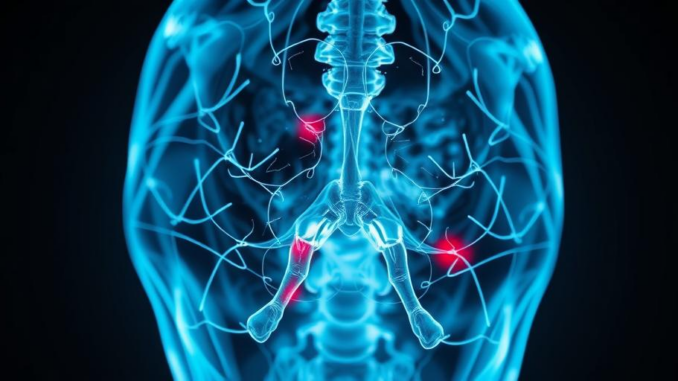
Summary
This article explores the groundbreaking advancements in AI for healthcare, focusing on its ability to detect bone fractures with greater accuracy than human doctors. It discusses the benefits, challenges, and real-world applications of AI in fracture detection within the UK’s National Health Service (NHS). The article also touches upon other AI applications in healthcare, including diagnostics, personalized medicine, and drug discovery.
** Main Story**
AI is making waves across all sectors, but healthcare? It’s practically a revolution in progress. Specifically, the way AI’s helping us spot bone fractures, sometimes even better than doctors, is worth a deeper look. So, let’s get into it, talking about the good, the not-so-good, and how it’s all playing out in places like the UK’s NHS.
AI: The Fracture-Finding Superhero
You know, it’s pretty impressive how AI’s been stepping up in detecting fractures, especially those tricky, subtle ones that can easily slip past a doctor’s eye. I read a study recently that noted urgent care physicians can miss fractures in up to 10% of cases! That’s where AI comes in. These algorithms are trained on huge amounts of medical images. They can pick up on patterns and tiny details that even the most experienced doctors might miss.
And what does that mean for patients? Quicker diagnoses, faster treatment, and ultimately, better outcomes. Think about it; catching a fracture early can prevent all sorts of long-term issues, like arthritis or chronic pain. So it’s not just about convenience, it’s about genuinely improving lives.
AI to the Rescue: The NHS Example
Over in the UK, the National Health Service (NHS) is already on board with AI for fracture detection. They recognize the potential to not only improve patient care, but also ease the pressure on their already stretched healthcare staff. NICE (the National Institute for Health and Care Excellence) actually recommends using a bunch of AI tools, like TechCare Alert, BoneView, RBfracture, and Rayvolve, in urgent care settings.
These tools are designed to assist radiologists and other professionals with analyzing X-rays. The goal? Make sure fractures are spotted quickly and accurately, even when workloads are crazy. The plan is to cut down on missed diagnoses, reduce harm to patients, and generally make things run more smoothly. It’s a big step forward.
But It’s Not All Sunshine and Roses
Of course, implementing AI in healthcare isn’t without its challenges. I mean, you can’t just throw the tech at a problem and expect it to fix everything. You’ve got to train healthcare professionals properly, so they understand what the AI can and can’t do. It’s about using it as a tool, not replacing human expertise entirely.
And then there’s the whole privacy and security angle. You’re dealing with sensitive patient data, so you have to make sure it’s protected. Regular monitoring and evaluation are vital too. You need to make sure the AI is accurate, reliable, and safe, all the time. It’s a continuous process.
The Bigger Picture
Here’s the thing: fracture detection is just the tip of the iceberg. AI has the potential to transform healthcare in so many ways. For example:
- Early Disease Detection: Spotting things like cancer or diabetic retinopathy sooner.
- Personalized Treatment: Tailoring treatment plans based on individual patient data.
- Faster Drug Development: Predicting how drugs will interact and their effectiveness.
- Automation: Automating tasks like analyzing medical images.
- Remote Monitoring: Keeping an eye on patients from a distance.
- Fraud Detection: AI can even help identify fraudulent claims.
Honestly, the future of AI in healthcare looks bright. It’s about improving patient outcomes, cutting costs, and making healthcare better for everyone. And as the technology keeps getting better, you can expect even more cool and innovative applications to come along.
The Road Ahead: Let’s Do This Right
We’re still in the early days of AI in healthcare, but the potential is undeniable. The key? Continued research, development, and, crucially, collaboration between AI experts, healthcare professionals, and policymakers. If we get that right, AI-powered tools promise to reshape the future of healthcare. An era of more accurate, efficient, and patient-centered care could be upon us. Now, isn’t that something to look forward to?


The point about AI’s potential for personalized treatment is particularly exciting. Imagine treatment plans tailored to individual genetic profiles, maximizing effectiveness and minimizing adverse reactions. What advancements do you foresee in integrating AI with genomic data to achieve this level of precision?
That’s a fantastic point! The integration of AI with genomic data is where things get truly transformative. I think we’ll see AI become much better at predicting individual responses to medications based on genetic markers. This will minimize trial and error, leading to safer and more effective treatment plans. Exciting times ahead!
Editor: MedTechNews.Uk
Thank you to our Sponsor Esdebe
AI spotting fractures better than doctors, eh? Are we *really* trusting algorithms trained on potentially biased datasets to make definitive calls? I wonder how long until we see lawsuits blaming AI for missed hairline fractures and subsequent delayed treatment? Just asking for a friend…
That’s a really important point! The potential for bias in datasets is a serious consideration. Ongoing auditing and diversification of training data are essential to ensure fairness and accuracy across different demographics. It’s a collaborative effort requiring vigilance from developers, clinicians, and regulators. What steps do you think are most crucial in mitigating this risk?
Editor: MedTechNews.Uk
Thank you to our Sponsor Esdebe
AI “assisting” radiologists… Is that like Skynet “assisting” humanity? Seriously, though, if AI misses a fracture because it wasn’t trained on *my* demographic, who gets sued? Asking for, uh, my skeleton.
That’s a thought-provoking question! The legal and ethical aspects are definitely complex. As AI becomes more integrated, establishing clear lines of responsibility is crucial. Ongoing discussions involving legal experts, ethicists, and healthcare providers will be essential to navigate these uncharted waters effectively.
Editor: MedTechNews.Uk
Thank you to our Sponsor Esdebe